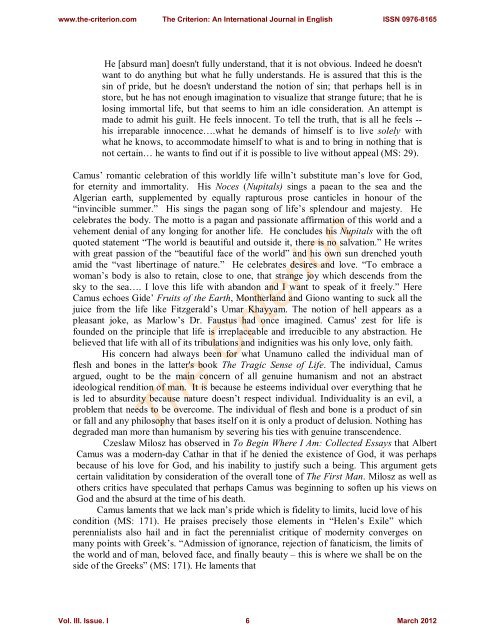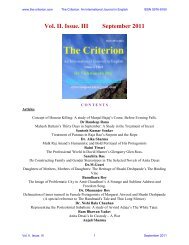Albert Camus: The Rebel Absurdist - The Criterion: An International ...
Albert Camus: The Rebel Absurdist - The Criterion: An International ...
Albert Camus: The Rebel Absurdist - The Criterion: An International ...
You also want an ePaper? Increase the reach of your titles
YUMPU automatically turns print PDFs into web optimized ePapers that Google loves.
www.the-criterion.com <strong>The</strong> <strong>Criterion</strong>: <strong>An</strong> <strong>International</strong> Journal in English ISSN 0976-8165<br />
He [absurd man] doesn't fully understand, that it is not obvious. Indeed he doesn't<br />
want to do anything but what he fully understands. He is assured that this is the<br />
sin of pride, but he doesn't understand the notion of sin; that perhaps hell is in<br />
store, but he has not enough imagination to visualize that strange future; that he is<br />
losing immortal life, but that seems to him an idle consideration. <strong>An</strong> attempt is<br />
made to admit his guilt. He feels innocent. To tell the truth, that is all he feels --<br />
his irreparable innocence….what he demands of himself is to live solely with<br />
what he knows, to accommodate himself to what is and to bring in nothing that is<br />
not certain… he wants to find out if it is possible to live without appeal (MS: 29).<br />
<strong>Camus</strong>’ romantic celebration of this worldly life willn’t substitute man’s love for God,<br />
for eternity and immortality. His Noces (Nupitals) sings a paean to the sea and the<br />
Algerian earth, supplemented by equally rapturous prose canticles in honour of the<br />
“invincible summer.” His sings the pagan song of life’s splendour and majesty. He<br />
celebrates the body. <strong>The</strong> motto is a pagan and passionate affirmation of this world and a<br />
vehement denial of any longing for another life. He concludes his Nupitals with the oft<br />
quoted statement “<strong>The</strong> world is beautiful and outside it, there is no salvation.” He writes<br />
with great passion of the “beautiful face of the world” and his own sun drenched youth<br />
amid the “vast libertinage of nature.” He celebrates desires and love. “To embrace a<br />
woman’s body is also to retain, close to one, that strange joy which descends from the<br />
sky to the sea…. I love this life with abandon and I want to speak of it freely.” Here<br />
<strong>Camus</strong> echoes Gide’ Fruits of the Earth, Montherland and Giono wanting to suck all the<br />
juice from the life like Fitzgerald’s Umar Khayyam. <strong>The</strong> notion of hell appears as a<br />
pleasant joke, as Marlow’s Dr. Faustus had once imagined. <strong>Camus</strong>' zest for life is<br />
founded on the principle that life is irreplaceable and irreducible to any abstraction. He<br />
believed that life with all of its tribulations and indignities was his only love, only faith.<br />
His concern had always been for what Unamuno called the individual man of<br />
flesh and bones in the latter's book <strong>The</strong> Tragic Sense of Life. <strong>The</strong> individual, <strong>Camus</strong><br />
argued, ought to be the main concern of all genuine humanism and not an abstract<br />
ideological rendition of man. It is because he esteems individual over everything that he<br />
is led to absurdity because nature doesn’t respect individual. Individuality is an evil, a<br />
problem that needs to be overcome. <strong>The</strong> individual of flesh and bone is a product of sin<br />
or fall and any philosophy that bases itself on it is only a product of delusion. Nothing has<br />
<strong>The</strong> <strong>Criterion</strong><br />
degraded man more than humanism by severing his ties with genuine transcendence.<br />
Czeslaw Milosz has observed in To Begin Where I Am: Collected Essays that <strong>Albert</strong><br />
<strong>Camus</strong> was a modern-day Cathar in that if he denied the existence of God, it was perhaps<br />
because of his love for God, and his inability to justify such a being. This argument gets<br />
certain validitation by consideration of the overall tone of <strong>The</strong> First Man. Milosz as well as<br />
others critics have speculated that perhaps <strong>Camus</strong> was beginning to soften up his views on<br />
God and the absurd at the time of his death.<br />
<strong>Camus</strong> laments that we lack man’s pride which is fidelity to limits, lucid love of his<br />
condition (MS: 171). He praises precisely those elements in “Helen’s Exile” which<br />
perennialists also hail and in fact the perennialist critique of modernity converges on<br />
many points with Greek’s. “Admission of ignorance, rejection of fanaticism, the limits of<br />
the world and of man, beloved face, and finally beauty – this is where we shall be on the<br />
side of the Greeks” (MS: 171). He laments that<br />
Vol. III. Issue. I 6 March 2012
















